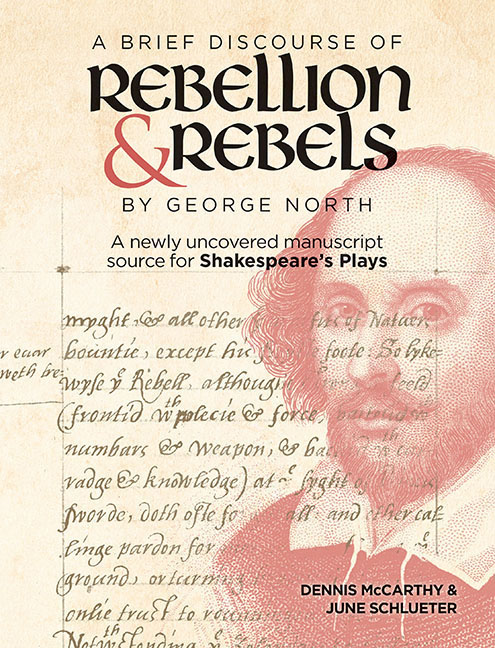 'A Brief Discourse of Rebellion and Rebels' by George North
'A Brief Discourse of Rebellion and Rebels' by George North Book contents
- Frontmatter
- Contents
- Acknowledgments
- 1 George North and the Kirtling Hall Manuscript
- 2 Uncovering Connections Between North's “Discourse” and Shakespeare's Plays
- 3 The Final Hours of Jack Cade
- 4 The Fool, Merlin's Prophecy, and the Upside-Down World of King Lear
- 5 Political Monologues and a Glimpse of Coriolanus
- Afterword: The Odds That the Parallels Are Coincidental
- The Transcript: “A Brief Discourse of Rebellion and Rebels,”, by George North
- Facsimile: “A brief discourse of rebellion and Rebells, wher'in isshowyd, ye treasur yt Traytors in yye execution of theyr treason, by tym attayne to,” by George North
- Index
1 - George North and the Kirtling Hall Manuscript
Published online by Cambridge University Press: 09 October 2019
- Frontmatter
- Contents
- Acknowledgments
- 1 George North and the Kirtling Hall Manuscript
- 2 Uncovering Connections Between North's “Discourse” and Shakespeare's Plays
- 3 The Final Hours of Jack Cade
- 4 The Fool, Merlin's Prophecy, and the Upside-Down World of King Lear
- 5 Political Monologues and a Glimpse of Coriolanus
- Afterword: The Odds That the Parallels Are Coincidental
- The Transcript: “A Brief Discourse of Rebellion and Rebels,”, by George North
- Facsimile: “A brief discourse of rebellion and Rebells, wher'in isshowyd, ye treasur yt Traytors in yye execution of theyr treason, by tym attayne to,” by George North
- Index
Summary
The unpublished manuscript “A Brief Discourse of Rebellion and Rebels,” now housed in the British Library, is a little less than 450 years old. George North wrote the treatise in 1576, signing, dedicating, and presenting it to Roger, 2nd Lord North while living at the nobleman's Cambridgeshire manor, Kirtling Hall. It generated no known copies or contemporaneous allusions to it. Until now, no Shakespeare scholar has studied the manuscript, and it has probably remained little read. Yet, as our analysis has revealed, “Discourse” is not merely the only uniquely existent, evidently uncopied document to have had a substantial impact on the canon; it is one of the most influential Shakespearean source texts in any form. In one year's work on the manuscript, we have traced more than twenty Shakespearean monologues and passages back to North's essay. These include Gloucester's opening soliloquy about his deformed appearance and villainous determination (Richard III 1.1.14–30), Canterbury's discussion of aristocratic order in the societies of bees (Henry V 1.2.183–212), Macbeth's comparison of various breeds of dogs to different classes of men (Macbeth 3.1.93–102), the citizens’ uprising in Coriolanus (Act 2), and essentially all the events surrounding Jack Cade's fatal fight with Alexander Iden in his garden (2 Henry VI 4.10). While scholars had long believed that Shakespeare had invented the circumstances of Cade's final hours, a reading of Jack Cade's poetic soliloquy in “Discourse” confirms we have now found the source. Similarly, George North's discussion and quoting of a Merlin prophecy also clears up long-standing confusions over the origin and purpose of the Fool's Merlin prophecy in King Lear (3.2.79– 95). In terms of the number of plays, scenes, and passages affected, the scope of the manuscript's influence likely exceeds all other known Shakespearean sources, excepting only the Chronicles of Hall and Holinshed and Thomas North's Plutarch's Lives.
Considering the unusual nature of this discovery, we have taken painstaking steps to assure the uniqueness of the links between “Discourse” and various Shakespearean plays. This includes the use of plagiarism software and rigorous searches of the Early English Books Online–TCP Partnership database (EEBO) to exclude the possibility of other source texts for the shared content and parallel passages.
- Type
- Chapter
- Information
- 'A Brief Discourse of Rebellion and Rebels' by George NorthA Newly Uncovered Manuscript Source For Shakespeare's Plays, pp. 1 - 10Publisher: Boydell & BrewerPrint publication year: 2018


